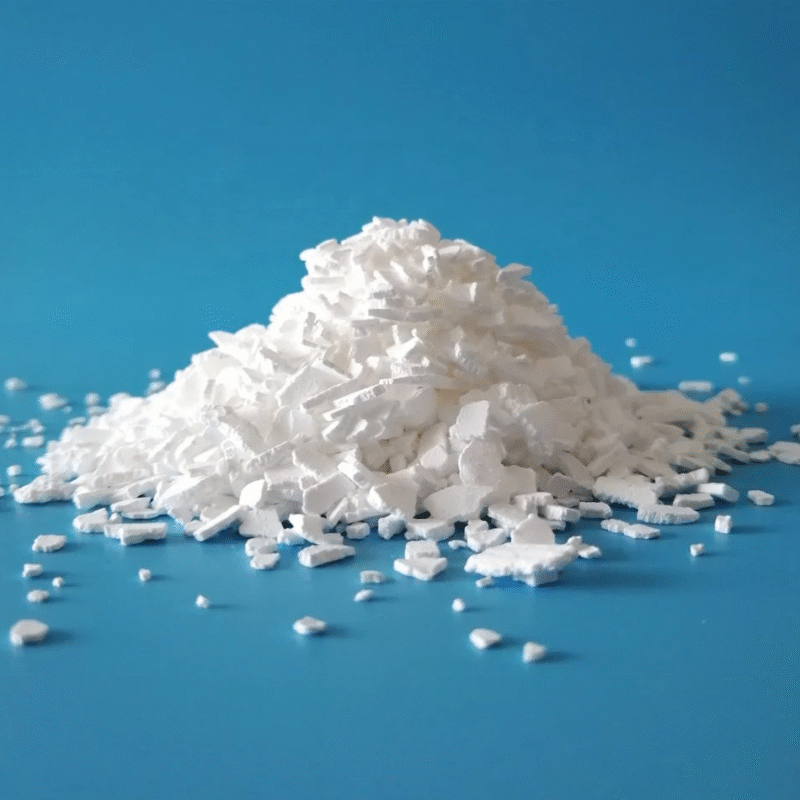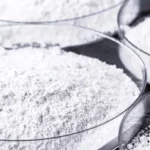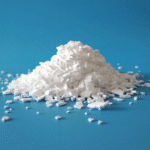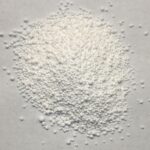Calcium Chloride (CaCl₂): Properties, Uses, and Industrial Applications
Calcium Chloride (CaCl₂) is a chemical compound that consists of one calcium atom bonded to two chlorine atoms. It is commonly used in various industries due to its unique properties and versatile applications. In this article, we will explore the properties, uses, and benefits of calcium chloride.
What is Calcium Chloride (CaCl₂)?
Calcium Chloride (CaCl₂) is an inorganic compound composed of calcium and chlorine. It appears as a white crystalline solid that is highly soluble in water. It is widely used in multiple industries due to its hygroscopic nature, low freezing point, and chemical stability.
Properties of Calcium Chloride
| Property | Value / Description |
|---|---|
| Chemical Formula | CaCl₂ |
| Molar Mass | 110.98 g/mol |
| Appearance | White, odorless, crystalline solid |
| Solubility | Highly soluble in water and alcohol |
| Hygroscopic Nature | Absorbs moisture from the air |
| Melting Point | 772°C |
| Boiling Point | 1,935°C |
Calcium chloride (CaCl₂) is a white crystalline solid with a hygroscopic nature, meaning it can absorb moisture from the air. Some notable properties of calcium chloride include:
Solubility:
Calcium chloride is highly soluble in water, forming a clear, colorless solution. It is one of the most soluble calcium salts.
Melting and Boiling Points:
Calcium chloride has a high melting point of 772 degrees Celsius and a boiling point of approximately 1,935 degrees Celsius.
Hygroscopicity:
Calcium Chloride (CaCl₂) has a strong affinity for water and can attract moisture from the atmosphere, even at low humidity levels. This property makes it useful as a desiccant or drying agent.
Deliquescence:
Calcium chloride is deliquescent, which means it can absorb enough moisture from the air to dissolve and form a liquid solution.
Exothermic Reaction:
When calcium chloride dissolves in water, it undergoes an exothermic reaction, releasing heat. This property makes it useful for certain applications, such as ice melting.
Calcium Chloride (CaCl₂) Uses
Calcium Chloride (CaCl₂) is widely used in various industries due to its versatile applications. Here are some common uses of calcium chloride:
De-icing and Road Maintenance:
Calcium chloride is used to melt ice on roads, sidewalks, and airport runways. It absorbs moisture and releases heat, making it effective in extreme cold.
-
Works below -25°C (-13°F)
-
Faster and more effective than rock salt
Calcium chloride is commonly used as a de-icing agent for roads and sidewalks during winter. It lowers the freezing point of water, preventing the formation of ice and promoting the melting of existing ice and snow.
Dust Control:
CaCl₂ is sprayed on unpaved roads and construction sites to trap dust particles and keep them from becoming airborne.
-
Hygroscopic property attracts moisture
-
Reduces maintenance and improves visibility
Calcium Chloride (CaCl₂) can be applied to unpaved roads and construction sites to control dust. It attracts moisture from the air, reducing the amount of loose dust particles and minimizing airborne dust.
Concrete Accelerator:
Calcium chloride is used as a concrete accelerator in construction projects. It speeds up the setting and hardening of concrete, allowing for faster construction and reduced curing time.
Food Preservation:
-
Approved as a firming agent in canned vegetables
-
Used in cheese production to restore calcium balance
-
Acts as an electrolyte in sports drinks
Calcium chloride is used as a food additive to preserve fruits and vegetables. It helps maintain their firmness and extends their shelf life.
Desiccant:
Due to its hygroscopic nature, calcium chloride is used as a desiccant or drying agent in various applications. It can remove moisture from the air in packaging or storage environments to prevent spoilage or damage to products.
Water Treatment:
Calcium chloride is used in water treatment processes to adjust the hardness of water. It can help reduce the levels of dissolved minerals, such as magnesium and carbonate ions.
Industrial Processes:
Calcium chloride is utilized in various industrial processes, including petroleum refining, wastewater treatment, and chemical manufacturing. It can be used as a catalyst, a drying agent, or a flocculant to aid in the purification or separation of substances.
Pharmaceutical Applications:
Calcium Chloride (CaCl₂) is used in certain pharmaceutical formulations, such as intravenous solutions and tablets. It can act as a stabilizer or excipient in the formulation of medications.
Benefits of Calcium Chloride (CaCl₂)
Calcium chloride offers several benefits in different applications. Some of the key advantages of using calcium chloride include:
Effective De-icer:
Calcium chloride is highly effective in melting ice and snow due to its ability to lower the freezing point of water. It helps improve road safety during winter conditions.
Dust Control:
Calcium chloride is a cost-effective solution for dust control on unpaved roads and construction sites. It minimizes dust emissions, improves visibility, and reduces the need for frequent maintenance.
Concrete Acceleration:
Calcium chloride accelerates the setting and hardening of concrete, allowing for faster construction and reduced project timelines. It can be particularly beneficial in cold weather conditions where concrete curing may be challenging.
Versatile Applications:
Calcium chloride has a wide range of applications across various industries, making it a versatile compound for different needs.
Affordable and Readily Available:
Calcium chloride is relatively inexpensive and widely available, making it a cost-effective option for many industries.
Common Forms Available
| Form | Typical Use |
|---|---|
| Flakes | De-icing, dust control, concrete |
| Pellets | Residential and road de-icing |
| Liquid | Oilfield brines, food processing |
| Powder | Laboratory, pharmaceutical uses |
Frequently Asked Questions (FAQ)
❓ Is Calcium Chloride (CaCl₂) safe for use around plants and pets?
In low concentrations, yes. However, it can cause irritation if overused on vegetation or skin. Always follow manufacturer guidelines.
❓ What makes Calcium Chloride better than sodium chloride for de-icing?
CaCl₂ works at much lower temperatures and produces heat upon contact with water, making it faster and more effective.
❓ Is Calcium Chloride food-grade?
Yes, food-grade Calcium Chloride (CaCl₂) is available and approved by the FDA for use in food processing, brewing, and cheese production.
❓ Can Calcium Chloride (CaCl₂) be used for moisture control?
Absolutely. It’s highly hygroscopic and commonly used in desiccant systems and dehumidifiers.
Conclusion
Calcium Chloride (CaCl₂) is an indispensable material across industries—whether it’s keeping roads ice-free, stabilizing dust, or enhancing oilfield operations. Its versatility, safety, and cost-effectiveness make it a preferred choice for industrial, agricultural, and commercial applications.
Explore the properties, benefits, and diverse industrial uses of Calcium Chloride (CaCl₂) in de-icing, dust control, oil drilling, and more.
-
“what is calcium chloride used for”
-
“calcium chloride in oil and gas industry”
-
“benefits of calcium chloride in road de-icing”
-
“calcium chloride dust control solutions”
-
“calcium chloride for food and beverage applications”
📞Need High-Quality Calcium Chloride for Industrial Use?
We supply CaCl₂ in flakes, pellets, liquid, and powder—tailored for your industry’s specific needs. Contact us for bulk pricing and expert support.
👉 Request a quote now or speak with our technical team.
📩 Email: [email protected]
📞 Call:+971 4 878 2031
🌐 https://pub-ltd.com/contact-us/
Get in touch today to speak with our experts, request a technical data sheet, or receive a custom quote for Calcium Chloride (CaCl₂) tailored to your project. PUB-Ltd as your Calcium Chloride (CaCl₂) Supplier & Provider. For more information or to place an order, please contact PUB-Ltd sales team 📩 Contact Us Now.




